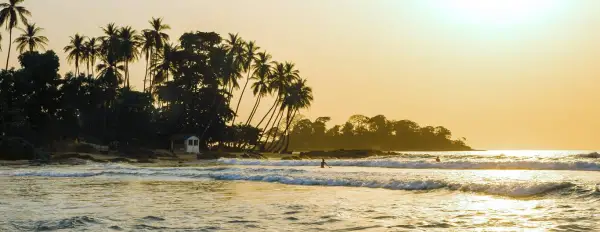Small Group Experiential Travel
Tour Code
MCWA
Start
Dakar (DSS)
End
Abidjan (ABJ)
Tour type
Cultural
Max Group Size
16
When To Go
Feb, Nov
Activity Level
2 - Moderate
Overnight in
Banjul, Accra, Monrovia, Dakar, Ziguinchor, Abidjan, Bissau, Orango, Conakry, Freetown, Kaolack
- Overview
- Info & Inclusions
- Itinerary
- Map & Hotels
- Photos
- Dates & Prices
Highlights
- An 8-country West African discovery
- Orango National Park on the Bijagós Archipelago
- Goree Island exploration in Senegal
- Freetown, Sierra Leone and the Tacugama Chimpanzee Sanctuary
- UNESCO site of Grand Bassam - Ivory Coast
- Cape Coast - Ghana
- Guinea & Guinea Bissau Touring
- Senegambia Stone Circles
Description
Our West Africa Odyssey tour will help you discover one of the most authentic and diverse regions of the world.
Whether you are a history buff or a nature lover, there is something for everyone. Discover rarely visited gems on this unforgettable cultural journey through 8 countries, from Dakar to Accra.
Inhabited by an astonishing diversity of traditional peoples, West Africa presents an extraordinary sweep of iconic African terrain.
Our adventure starts in the cosmopolitan Senegalese capital of Dakar on the western tip of the continent, and heads through the rarely-visited yet wonderful countries of Gambia, Guinea-Bissau, Guinea and Sierra Leone, before heading east through the remote roads of Liberia and the Ivory Coast before ending in Ghana.
West Africa is not the easiest place to travel, and for many travellers that is one of the reasons to go!
Roads can be rough and things don't always go as planned - but the unpredictable and spontaneous nature of journey is what keeps things interesting!
Travelling in underdeveloped and un-touristed destinations requires both patience and a sense of humour.
There may be problems with infrastructure, attitudes may be different, and maintenance may not be of as high a standard as one would always like, but this is very much part and parcel of travelling in such a region.
Whether you are a history buff or a nature lover, there is something for everyone. Discover rarely visited gems on this unforgettable cultural journey through 8 countries, from Dakar to Accra.
Inhabited by an astonishing diversity of traditional peoples, West Africa presents an extraordinary sweep of iconic African terrain.
Our adventure starts in the cosmopolitan Senegalese capital of Dakar on the western tip of the continent, and heads through the rarely-visited yet wonderful countries of Gambia, Guinea-Bissau, Guinea and Sierra Leone, before heading east through the remote roads of Liberia and the Ivory Coast before ending in Ghana.
West Africa is not the easiest place to travel, and for many travellers that is one of the reasons to go!
Roads can be rough and things don't always go as planned - but the unpredictable and spontaneous nature of journey is what keeps things interesting!
Travelling in underdeveloped and un-touristed destinations requires both patience and a sense of humour.
There may be problems with infrastructure, attitudes may be different, and maintenance may not be of as high a standard as one would always like, but this is very much part and parcel of travelling in such a region.
Price Includes
- Breakfast and dinner (local restaurants and hotels) daily and some lunches.
- All transport (including internal flights and taxes), accommodation, sightseeing and entrance fees for sites noted as 'visited' in the detailed itinerary.
- Gratuities for local guides, drivers, restaurant staff, porters.
- Airport transfers for land & air customers and for early arriving/late departing passengers who book their extra nights through us.
Exclusions
- International airfare to/from the tour.
- Tour Leader gratuities, most lunches, drinks, personal items (phone, laundry, etc), international air taxes (if applicable), visa fees (see below), and any excursions referenced as 'optional'.
- Airport transfers for Land Only customers.
- Optional trip cancellation insurance (strongly recommended for this trip).
- Our post-reservation trip notes offer further guidance on optional meal costs, shopping, and visas.
- VISAS & RELATED FEES:
- As we include 8 countries on this tour, one can expect a good number of bureaucratic hoops to jump through with respect to entry requirements for each one visited on this trip. In brief:
- On your behalf, we will apply for official pre-clearance documents for four of the countries for which we need passport scans and passport photos. You will need these REGARDLESS of your nationality. There are fees associated with this, which have been adding up to around USD 1050 per person, for which we will bill you separately in advance (subject to change) -- this is NOT included in base tour price. This amount is IN ADDITION to the cost of the actual visas for which the traveller pays directly, some of which are visa-in-advance (some online) and available upon arrival.
- Full details are provided upon reservation and will be enhanced/updated as needed as we draw nearer to departure.
- A YELLOW FEVER VACCINATION CERTIFICATE IS REQUIRED FOR THIS TOUR
Trip Info
- Seasonality and Weather:
This tour is offered between October & February, a time-frame that tends to have the best combination of heat and humidity, though this is a hot and sticky place at the best of times. Our fall date tends to be slightly hotter on average.
We choose to visit at these times as seasonal heavy rains at other times can make roads impassable and some locations may be closed. Breezy seaside locations enjoy relief from the heat year-round; that said, we will experience considerable sticky HEAT on this trip. - Transport and Travel Conditions:
The itinerary has been designed to be as comfortable as possible, but many parts of West Africa are still largely undeveloped. Many road journeys are long and rough and sometimes dusty... or muddy!
In most countries we visit the land transport will be by private AC bus, Toyota Coaster or equivalent with approx 25+ seats. Sometimes 2 smaller vans may be used instead of a larger bus.
In general, this is a tour with a lot of variables and things that can "go wrong" -- roads wash out, tires go flat, hot water simply stops (or never starts), air-conditioning is weak, and road journeys can take longer than anyone expects. One must be open-minded, patient, and focused on the task at hand: enjoying the region's myriad cultures, sights, and sounds, and its friendly hospitable peoples.
The program is busy, with lots of moving around, very full days of travel and activities, with some challenges to your comfort and health -- bad roads, extreme heat, early starts, remote locations. If you have a weak constitution, compromised immunity, or any pre-existing medical conditions that could call for readily accessible, modern medical care, you should very carefully consider your suitability.
Many past travellers have described this tour as "tough," "challenging," "tiring," and, of course, "totally worth it."
Please note that a government travel advisory currently applies to this tour, specifically and limited to our daytime journey to Guinea-Bissau on Day 8. Though we expect this journey to occur without incident, we encourage all travellers (as we do for any destination) to review online government advisories that provide guidance on, among other things, issues concerning security (please also refer to our general Booking Terms & Conditions under the “resources” tab on this page). We are presently very confident that your journey will be problem-free, and want to ensure that you feel likewise before choosing to join this adventure.
A word about TOUR STATUS: While we appreciate that everyone wants to know when their chosen date for this tour will be 'guaranteed,' this tour is a special case in that our reaching minimum numbers is only one small part of the process. This tour usually sells out well in advance, but we often hold off on confirming final dates and itinerary until we have confirmed ALL arrangements at destination. This tour sometimes has to run in a different order, which could affect overall dates and tour start/end points. We will only confirm once such details are finalized.
Am I suitable for this tour? Please refer to our self-assessment form - Accommodation:
In major cities the hotels are generally of international standard (3-4 star). Outside of major cities the hotels tend to be more rustic & simpler properties where AC may or may not be functioning properly and a fan will then be used. All hotels have en-suite toilet & shower. Though more and more rare these days, you must be prepared for power and/or water failure in some more remote locales. These cautions aside, many past travellers have indicated that the high quality of the accommodation provided went a long way in making the overall trip "doable."
Hotel porterage is generally available (see inclusions) though you must be independent with luggage. Single rooms are limited in number and will likely be smaller than twins.
Please click on 'Map & Hotels' link for full information.
- Activity Level: 2
These are particularly busy tours that feature a lot of moving around, sometimes by train and short journeys on local transport. Walking tours of towns and cities are leisurely but you should be prepared to be on your feet for several hours. Some of our cultural trips that occur at high altitude and/or require greater independence with baggage handling (at hotels, airports, train stations) also fall into this category.
To learn more about the Activity levels, please visit our tour styles page. - Staff and Support:
Tour Leader throughout, local guides, drivers. - Group Size:
Maximum 16 plus Tour Leader
Download Itinerary
- Day 1:Arrival in Dakar, SenegalSitting at the continent’s western-most tip, Senegal marks the fusion point of Africa’s Arabic north, with the diverse and colourful cultures of the region’s southern gulf.
Hemmed in by the ever-encroaching sands of the Sahel, the waves of the Atlantic and the dense jungle of the Casamance region, Senegal often seems to work a beat and rhythm all on its own. Emphatically Muslim, yet exuding French undertones, it evokes both the best in colonial-era architecture and the worst vestiges of the slave trade.
Senegal's bustling, cosmopolitan capital of Dakar is always bursting with life. This is a city of busy streets, colourful markets and vibrant activity - at first it can seem chaotic, but embrace the rhythms of Dakar's life and you'll come to appreciate it just as much as the passionate people who live here.
Overnight in Dakar.
Included Meal(s): Dinner - Day 2:Dakar: Goree Island Exploration & Dakar City TourThis morning we take a short ferry ride to Gorée Island. The island of Gorée lies off the coast of Senegal, opposite Dakar.
From the 15th to the 19th Century this was one of the largest slave-trading centres on the African coast. Ruled in succession by the Portuguese, Dutch, English and French, its architecture is characterized by the contrast between the grim slave-quarters and the elegant houses of the slave traders. Today it continues to serve as a reminder of human exploitation and as a sanctuary for reconciliation. Our tour of Gorée Island includes a visit to the ethnographic museum to learn more about the history of the island, a UNESCO World Heritage Site.
In the afternoon we will return to Dakar and continue with a city tour. We will pass by the Presidential Palace and the picturesque residential district of Medina, as a well as pay a visit to the Musee des Civilizations Noires. We drive around 'Place de L'Independence', the beating heart of the city. Symmetrically designed, it contains majestic colonial buildings, including the Gouvernance (office of the French governor) and the Chamber of Commerce.
From there we drive past the Presidential Palace and drive on the Corniche through Medina.
Overnight in Dakar.
Included Meal(s): Breakfast and Dinner - Day 3:Dakar - Touba - KaolackAs we depart Dakar, we visit, and can climb, the steps of the African Renaissance Monument. Built by North Korean funding, it represents 'looking to the future of Africa.' The monument is a 52m (171 ft) tall bronze statue located on top of one of the twin hills known as Collines des Mamelles. Originally scheduled for completion in December 2009, delays stretched into early 2010, and the formal dedication occurred on 4 April 2010, Senegal's "National Day", commemorating the 50th anniversary of the country's independence from France.
We then continue to the city of Touba. Along our journey we will have the chance to stop at a Wolof village where we learn about the local customs and way of life. Touba is the holy city of Mouridism, a large Sufi order most prominent in Senegal and the Gambia. At the heart of the holy city lies its Great Mosque which we will visit. The mosque here is purported to be one of the largest in Africa, and since its completion in 1963 it has been continuously enlarged and embellished.
In the late afternoon we will arrive in the town of Kaolack. Situated on the right bank of the Saloum River, 95 miles (150 km) southeast of Dakar, this is an ocean and river port with an important export trade in peanuts (groundnuts) and salt.
Overnight in Kaolack.
Included Meal(s): Breakfast and Dinner - Day 4:Kaolack - Senegambia Stone Circles, Senegal - Banjul, GambiaAfter breakfast we depart for the Senegambia stone circles of Sine Ngayene, one of West Africa's greatest archaeological sites! As ancient monuments go, the stone circles of Senegal and Gambia may not be in the same league as other ancient ‘wonders’, yet this UNESCO World Heritage Site represents a remarkable cultural and architectural achievement of pre-historic western Africa. The site consists of four large groups of stone circles that represent an extraordinary concentration of over 1,000 monuments in a band 100 km wide along some 350 km of the River Gambia. The four groups, Sine Ngayène, Wanar, Wassu and Kerbatch, cover 93 stone circles and numerous tumuli, burial mounds, some of which have been excavated to reveal material that suggest dates between 3rd century BC and 16th century AD. Together the stone circles of laterite pillars and their associated burial mounds present a vast sacred landscape created over more than 1,500 years and reflecting a prosperous and highly organized society.
We then continue on to Banjul, the capital of The Gambia.* This is the smallest country on the continent, surrounded by Senegal on 3 sides and bordered by the Atlantic to the west. Arab traders provided the first written accounts of the Gambia area in the 9th and 10th Centuries, and The Gambia shares historical roots with many other West African nations.
* The last part of our day's journey involves a ferry river crossing which can involve a bit of a wait and a rather slow boat once we are able to embark.
Overnight in Banjul.
Included Meal(s): Breakfast and Dinner - Day 5:Banjul City TourToday we will enjoy a tour of Banjul and it’s surrounding region. We will start our day at the National Museum where we are introduced to the culture and history of this country! As we drive through Banjul we will make a stop at the busy central market! Since its founding in the mid-19th century, the Albert Market, an area of frenzied buying, bartering and bargaining, has been Banjul's main hub of activity. This cacophony of Banjul life is intoxicating, with its stalls stacked with everything imaginable, including hair extensions, shoes, household and electrical wares and the myriad colours and flavours of the fruit and vegetable market.
We then proceed to the Kachikally Museum associated with a nearby "crocodile pool", which is the true highlight of any stop here. Your should be able to get up-close-and-personal with the crocs, even touching them and taking a selfie with them!
In the afternoon we will visit Serrekunda, the most densely populated town in The Gambia. Serrekunda is actually made up of nine villages which have all merged into an urban sprawl. Here we will visit the Abuko cattle market.
After lunch we take the bus to the Tanji Fishing Village, the hub of fishing in Gambia, where fishermen arrive and depart. All kinds of Atlantic fish are caught and sold here; we will see how they smoke the fish for export. This is a vibrant and busy beach market -- great for photos!
Overnight in Banjul.
Included Meal(s): Breakfast and Dinner - Day 6:Banjul, Gambia - Ziguinchor, SenegalThis morning we say goodbye to the Gambia as we cross the border and enter the ‘other’ part of Senegal, the ‘Casamance’. Casamance is the region of Senegal that lies south of The Gambia along the Casamance River. Much of the area that is now Casamance was once the kingdom of Kasa. Kasa’s king, or mansa, was a leading trader with the Portuguese, and Casamance takes its name from the Portuguese adaptation of Kasa mansa (king of Kasa).
This afternoon we will explore a traditional Jola village where we learn about the customs and beliefs of the local people. The Jola (Jolla / Diola) tribe are heavily concentrated in the Foni area of south west Gambia and Casamance in Senegal as well as parts of the north of Guinea-Bissau. According to Senegambian oral history, the Jola ethnic group is among the ethnic groups who have been settled for the longest period of time in the Senegambian region.
Tonight we will overnight in the town of Ziguinchor, a melting pot of all the ethnic groups co-existing in Senegal. Jola have been the majority of the population in the region since at least 1500, and culturally share much with the people of Guinea-Bissau.
This evening (before dinner), we will take a motorized pirogue for a sunset cruise along the Casamance River, which is all mangroves. Home to endangered Manatees (which we will probably never see). We are hunting for bottlenose dolphins, but we will potentially see: pelicans, pink or dwarf flamingos, ibises, herons, spoonbills, and storks.
Overnight in Ziguinchor.
Included Meal(s): Breakfast and Dinner - Day 7:Ziguinchor, Senegal - Bissau, Guinea-Bissau: City TourThis morning we cross the border into Guinea-Bissau and head towards the capital, Bissau. Our route will take us via the settlements of Sao Domingos, Ingoré, Bula and Safim.
Remote and untouched are two words that would beautifully describe tiny Guinea-Bissau, one of Africa's least visited nations! Guinea-Bissau shares a beautiful Atlantic coastline with its neighbours Senegal and Guinea. Officially the Republic of Guinea Bissau, this was once a Portuguese colony (when it was known as Portuguese Guinea). Guinea-Bissau gained independence in 1974 following a protracted war of independence, and in the late 1990s a bloody civil war raged through the country, damaging the economy and infrastructure. The war ended in 1999, and today Guinea-Bissau remains one of the poorest countries in the world. The main source of foreign exchange is from the growing of cashew nuts.
Time-permitting, in the afternoon we will enjoy a Bissau city tour. The capital city of Bissau is a city suspended in time, with its crumbling colonial architecture, pastel coloured buildings, and narrow alleyways which are interesting to explore. Places that we will see include old Bissau (Bissau Velho), Palácio da Republica and the Port of Bissau (Porto de Pindjiguiti).
Overnight in Bissau.
Included Meal(s): Breakfast and Dinner - Day 8:Bissau - Orango National ParkThis morning drive to the main port where we board our private motorboat that will take us to the Bijagos Archipelago.
The Archipelago of the Bijagós is a place that few have discovered. Here one discovers a spattering of 88 palm-fringed-islands in the Atlantic Ocean, only 23 of them inhabited, off the coast of one of West Africa’s most dysfunctional yet beguiling states. This is perhaps one of the most beautiful places in the country. The archipelago is a protected Biosphere Reserve.
We will take our motorboat to Orango Island, passing by small islands and sandbanks (approx 4 hours). Covering an area of over 150,000 hectares, the Orango National Park, created in 1998, is located on the Bijagós Archipelago just off the Guinea Bissau coast. This was the first area to be awarded the protected status in Guinea Bissau and one of the places with the greatest biodiversity in the country. The declaration of national park is justified as it is home to the most westerly population of the common hippopotamus (Hippopotamus amphibius). The Bijagós Archipelago was declared a UNESCO Biosphere Reserve Bolama-Bijagós in 1996.
Overnight at/near Orango.
Included Meal(s): Breakfast and Dinner - Day 9:Orango National Park: Hippo ExcursionOrango Island is the third largest in the archipelago (after Formosa and Caravela) and is the centre of the Ilhas de Orango National Park. Our visit here will bring us closer to the Bijagó culture as we will visit different tabankas (villages) where we can learn about their traditions and rituals.
This morning we will visit Eticoga where we see the Tomb of the Queen Okinka Pampa and the Royal Family. We hope to be able to engage with members of the local community, and if possible we will visit the school.
We will return back to the hotel for lunch before heading out to the Anor (Anghor) region in the afternoon by boat. After a short journey by boat we will disembark on the beach and head out on foot. Here we will visit one of the most spectacular places on Orango Grande Island where we have the possibility of observing saltwater hippos in their natural habitat (as well as crocodiles and birds). Our walk takes us through mangrove forests and across a grassy savannah.
We return to our boat and cruise back to the hotel in time for dinner.
Overnight at Orango.
Included Meal(s): Breakfast and Dinner - Day 10:Orango National Park: Ambuduco VillageThis morning we will visit a local village, either Ambuduco, Menek, or Uno depending on sea conditions and tides. Our journey by boat takes us upriver through a peaceful mangrove region where we discover the true beauty of the island. Upon arrival at the small beach we walk to the village for some exploration.
After our time in the village we return to the hotel. The rest of the afternoon is free to relax in the beautiful surroundings.
Overnight at Orango.
Included Meal(s): Breakfast and Dinner - Day 11:Orango National Park - BissauThis morning after breakfast we will return by boat to Bissau. We disembark in the town of Quinhámel where we connect with our bus for the short drive back into the city. We'll visit the local arts and crafts market to pick up any Guinea-Bissau souvenirs that might catch your eye.
Overnight in Bissau.
Included Meal(s): Breakfast and Dinner - Day 12:Bissau, Guinea-Bissau - Fly to Dakar, Senegal - Bandia Wildlife Reserve, SalyEarly this morning we fly to Dakar from where we drive to visit Bandia Park, where we enjoy a morning safari.
The small Bandia Reserve is a real ecological jewel in the crown of Senegal, and has succeeded in reintroducing much of the native flora and fauna that had gradually disappeared due to demographic pressure and poaching. Here in a setting of baobabs and thorny scrub vegetation we have the chance to see a variety of wildlife ranging from Burchell’s Zebra, giraffe, Roan Antelope, Cape Buffalo, Cape eland and Oryx to greater kudu, and Somali Ostrich. As well, there are over 120 bird species represented here.
Overnight in Saly.
Included Meal(s): Breakfast and Dinner - Day 13:Saly - Joal Fadiouth - Dakar, Senegal - Fly to Conakry, GuineaAfter breakfast we head for the village of Joal Fadiouth. Joal Fadiouth is a sleepy 'twin village': Joal lies on the mainland while Fadiouth, linked by a narrow 400-meter wooden bridge, lies on an island built entirely of seashells. In the traditional Serere village we will see the cathedral, market place, and the famous cemetery where Muslims, Christians, and Animists are buried.
Afternoon transfer to the airport for our flight to Conakry. This country is often confused with its neighbour Guinea-Bissau to the north. For easier distinction, Guinea is commonly referred to as Guinea Conakry, Conakry being its capital city and the largest city. Despite its unique beauty and magnificence, Guinea is rarely visited by tourists. Guinea's mineral wealth makes it potentially one of Africa's richest countries, but its people are among the poorest in West Africa and the tourism industry here is poorly-developed.
Overnight in Conakry.
Included Meal(s): Breakfast and Dinner - Day 14:Conakry Touring & Kassa Island Boat JourneyThis morning we will drive to the port of Boulbinet from where we cruise to the Loos Islands (Îles de Los) in a motorized canoe.
This island group lies just off the coast of Conakry, and here on the islands are the villages of the fishermen. We will see one of the fishing camps during our visit. The exact time period of settlement on the islands is unknown, but historically they rose to prominence during the slave trade. In 1755 a gentleman by the name of Miles Barber of the African Company of Liverpool established a factory here employing workers skilled in ship repair as well as pilots for the local rivers. This led to Kassa being known as "Factory Island."
This afternoon, our touring will take us to the Conakry National Museum (possibly closed for renovations), home to a remarkable collection of artefacts, statutes, masks and ancient musical instruments. The museum is not so big in size, but its contents are rich in the cultural heritage of the Guineans.
We will visit the Niger Market (Marché du Niger), a chaotic, colourful, smelly and fascinating place. This market is the city's most important place of local trade. The Conakry Grand Mosque was built by Guinea's first president Ahmed Sékou Touré in 1982, and is one of the largest in sub-Saharan Africa.
Overnight in Conakry.
Included Meal(s): Breakfast and Dinner - Day 15:Conakry, Guinea - Freetown, Sierra LeoneEarly this morning we start our drive to Freetown, Sierra Leone, passing many small villages along the way.* Sierra Leone has had more than a few challenges thrown its way. But, through it all, the country has survived and rebounded to become one of the true shining stars of the West Africa region. Today this welcoming and beautiful English-speaking nation is thriving again, and is surely one of the more interesting and under-explored countries on the continent.
* NOTE: this is a long and sometimes difficult drive, owing to poor road conditions. Our transit can also be made more difficult if it has rained recently.
Overnight in Freetown.
Included Meal(s): Breakfast and Dinner - Day 16:Freetown: City Tour & Chimpanzee SanctuaryToday we will explore Freetown, a city bubbling with energy, colour and charm.
The population of Freetown is ethnically, culturally, and religiously diverse. The city is home to a significant population of virtually all of Sierra Leone's ethnic groups, with no single ethnic group forming a majority of the city's population. The city was founded in 1792 by Lieutenant John Clarkson and African American ex-slaves and free people called the Nova Scotian Settlers, who were transported to Sierra Leone by the Sierra Leone Company in 1792. The city of Freetown was a haven for free-born and freed African American, liberated African and Caribbean settlers; and their descendants are known as the Creole people. Freetown is the oldest capital to be founded by African Americans, having been founded thirty years before Monrovia, Liberia and is noted for its unique Creole architecture reflecting American and Caribbean influences.
Freetown feels very inviting, with its beautiful setting and welcoming people. The heart of the town is home to a collection of historical sights and vibrant markets, and the atmosphere is frenzied but friendly. The principal landmark in Freetown is a 500-year old tree known to locals simply as “The Cotton Tree.”
The Sierra Leone National Museum sits in the shadow of the tree. Small but thought-provoking, the collection includes many important artifacts. Just a few blocks from the Cotton Tree lies St. John's Maroon Church. Built in 1820, the small white building is known for its large windows and simple architecture.
This afternoon we will visit Tacugama Chimpanzee Sanctuary. Tacugama was established in 1995 to rehabilitate confiscated, orphaned and abandoned chimpanzees with the aim to release back them into their natural habitat. The sanctuary now cares for about 75 chimpanzees in several forested enclosures. Our tour here is timed to coincide with feeding to give us the best opportunity to observe the chimpanzees.
Overnight in Freetown.
Included Meal(s): Breakfast and Dinner - Day 17:Bunce Island Excursion, Sierra Leone - Monrovia, LiberiaToday we visit Bunce Island where we tour the site of an 18th Century British slave castle. Located about 20 miles upriver from Freetown, Bunce Island lies in the Sierra Leone River (also called the "Freetown Harbour"), the vast estuary formed by the Rokel River and Port Loko Creek. Although just a tiny island only about 1650 feet long and 350 feet wide, its strategic position at the limit of navigation in Africa's largest natural harbour made it an ideal base for European slave merchants. Founded around 1670, tens of thousands of African captives we exported from here to North America and the West Indies until the British Parliament finally closed it down in 1808.
Bunce Island was one of about 40 slave castles, or fortified trading posts, that European merchants built along the coast of West Africa during the period of the Atlantic slave trade. Slave traders based at the castles purchased African captives, imprisoned them, and loaded them aboard the slave ships that took them on the infamous middle passage to America. Slave castles have been called "warehouses of humanity."
Later in the day we return to Freetown and then head to the airport by water taxi for our flight to Monrovia, the capital of Africa's first independent state. After a complicated history, Liberia is back on its feet and looking ahead to a more promising future. This West African country is one of the world’s lesser travelled destinations, and Monrovia is rich with important sites and a fascinating history!
Overnight in Monrovia.
Included Meal(s): Breakfast and Dinner - Day 18:Monrovia: Village Visit & City TouringToday we have a tour of the capital of Africa's first independent state. We will stroll through the streets, stopping at the Provident Baptist Church (Liberia's oldest church), as well as the Centennial Pavilion and the National Museum. The great museum collection was depleted during the war years, but renovations (always ongoing) have created space for photo and art exhibitions as well as the ethnic and historical exhibits representing Liberian tribal cultures.
We will also take in the panoramic view of the city from the top of the ruins of the Ducor Hotel, which used to be one of the most prominent hotels not only in Liberia but in the whole Africa. Being the first international-class hotel constructed in Liberia (operated by Intercontinental Hotels), Ducor Hotel was frequented by politicians, diplomats and business people from across the continent. The hotel closed in 1989, just before the coup of Charles Taylor, which led to the First Liberian Civil War.
In the afternoon we visit Wolakor Cultural Village. This tiny Liberian village, in the rainforest just outside of Monrovia, offers a unique look into the rural life of Liberians and a chance to indulge in the fascinating culture of this green African paradise. Enjoy an exciting and entertaining cultural dance and drum performances. After our village visit we will return to the Monrovia.
Overnight in Monrovia.
Included Meal(s): Breakfast and Dinner - Day 19:Monrovia, Liberia - Accra, GhanaToday we fly to Accra, Ghana and, air schedules permitting, may accomplish some of our sightseeing program upon arrival.
Accra, the capital of Ghana, is a vibrant and bustling city with a rich history. It's a melting pot of cultures, where traditional African customs blend seamlessly with modern influences. Here the traveller will experience a mix of old and new, from historic landmarks to modern skyscrapers. The city offers a unique opportunity to delve into Ghana's past, explore its diverse culture, and engage with its warm and friendly people.
Overnight in Accra.
Included Meal(s): Breakfast and Dinner - Day 20:Accra City TouringToday's tour will take us to the Kwame Nkrumah Memorial Park, named after the first President of Ghana, Osagyefo Dr. Kwame Nkrumah. The park was formerly known as the polo grounds
where Dr. Kwame Nkrumah stood to declare independence for Ghana, and it the final resting place for the late President and his wife.
We will drive through the Makola Market to the Old City of Accra -- James Town, with its vibrant local community. Jamestown boasts a fascinating history, and we will learn of its tragic slaving past to its colourful present. We will also visit the W.E.B. DuBois Center, honoring the life of one of the most prominent Pan-Africanists who chose to live and work in Ghana.
Our city touring will also include a stop at Independence Square, Accra’s open-air ceremonial grounds where all national celebrations are held. We will be sure to visit the uniquely designed coffin workshops at Teshie-Nungua. While most people in Ghana celebrate funerals lavishly in the belief that by honoring the deceased in proper fashion will grant favours for the family left behind, it is only the Ga people of Ghana who create extraordinary fantasy coffins for such occasions.
At the National Museum of History and Ethnography (if not still under ongoing renovations) we will observe exhibits that reflect the heritage of Ghana throughout history.
Overnight in Accra.
Included Meal(s): Breakfast and Dinner - Day 21:Accra: The Cape Coast & Kakum National ParkWe depart early this morning and head towards Kakum National Park. Our route takes us through the historic Denkyira Kingdom. The Denkyira were once a powerful nation of Akan people that existed on the peninsula from the 15th Century, and at one time dominated the trade with Europeans.
Kakum National Park is one of West Africa’s last surviving coastal tropical rainforests. Extending over 360sq km, Kakum is the home to a remarkable population of forest elephants as well as other endangered animals. The park is also home to approximately 250 bird species as well as many species of butterflies, flora and fauna. We will enjoy a 2km nature walk through the forest and discover the wide variety of exotic floral species and the medicinal values they offer. During our time here we will take a walk on the canopy walkway, a series of seven bridges hanging above the forest floor.
After a break for lunch, we will embark on a tour of the infamous forts, castles and slave dungeons of Ghana. History will unfold the story of the slave trade which the impact is still felt beyond the shores of Africa today. We will visit the Cape Coast Castle that was built by the Swedes in 1653 and later taken over by the British. Cape Coast Castle is one of roughly 40 “slave castles” along West Africa’s Gold Coast, and was the final stop for some enslaved Africans on the “middle passage” trading route to the Americas. Visiting the castle provides us with some insight into the dark history of slavery in Africa. The castle houses the West African Historical Museum, established by the Smithsonian Institute in collaboration with the Ghanaian Government in 1994.
Return to Accra.
Overnight in Accra.
Included Meal(s): Breakfast and Dinner - Day 22:Accra, Ghana - Fly to Abidjan, Ivory CoastToday we fly from to Abidjan, Ivory Coast (Cote d'Ivoire). The Ivory Coast is another example of a country with a recent troubled past that is now once again accessible to intrepid travellers who are looking to delve into the amazing diversity of West African culture.
Time permitting, we will commence with some sightseeing in Abidjan upon arrival. We will visit the new district of Yopougon as well as the indoor Treichville market, one of the most interesting on our tour. We then enjoy an excursion by motor boat on the Ebrié Lagoon for a general view of the “plateau”. The Ébrié Lagoon is separated for almost all of its length from the Atlantic Ocean by a narrow coastal strip. The 100km (60mi) long lagoon is linked to the sea by the Vridi Canal, while the Comoë River flows into it. The lagoon averages 4km (2½ mi) in width, and 5m (16ft) in depth. Abidjan and towns such as Grand Bassam and Bingerville lie on the lagoon.
Overnight in Abidjan.
Included Meal(s): Breakfast and Dinner - Day 23:Abidjan Touring: National Museum & Grand BassamToday we spend touring in and around Abidjan, perhaps the most sophisticated and modernized town in West Africa. The district of Plateau or "Little Manhattan" is a business area where one finds the most important departmental and administrative offices, multinational firms, and banks. Cocody is an upmarket suburb of Abidjan with a number of mansions that are home to most of the wealthy business people and ambassadors.
This morning we head to the UNESCO World Heritage site of Grand Bassam. This historical settlement served as the capital city of the French colonial masters between 1893 and 1896, making it Cote d’Ivoire’s first capital. The city lost its capital status when a major outbreak of yellow fever drove the French colonialists away. In 2012, Grand Bassam was added to the list of UNESCO World Heritage Sites, thanks to the historical and cultural value of its amazing range of colonial architecture marked by ancient buildings with galleries, verandas and gardens.
Back in the city, we'll visit the National Museum with its collection of Ivorian art, showcasing statues, masks, jewellery, tools, carved doors, and musical instruments from every region of the country (this museum may be either partially or entirely closed for renovation). We will also see the Saint Paul Cathedral (periodically closed, but we can visit the courtyard).
Overnight Abidjan.
Included Meal(s): Breakfast and Dinner - Day 24:Departure from AbidjanToday we say our farewells and head home.
SAFE JOURNEY!
Included Meal(s): Breakfast
Regions Visited: West Africa
Countries Visited: Gambia, Ghana, Guinea, Guinea-Bissau, Liberia, Senegal and Sierra Leone
Countries Visited: Gambia, Ghana, Guinea, Guinea-Bissau, Liberia, Senegal and Sierra Leone
*The red tour trail on the map does not represent the actual travel path.
The following is a list of sample hotels at some locations included on this tour. The hotels shown here are meant to provide a general sense of the standard of hotel we usually aim for; they are not necessarily confirmed for your chosen departure.
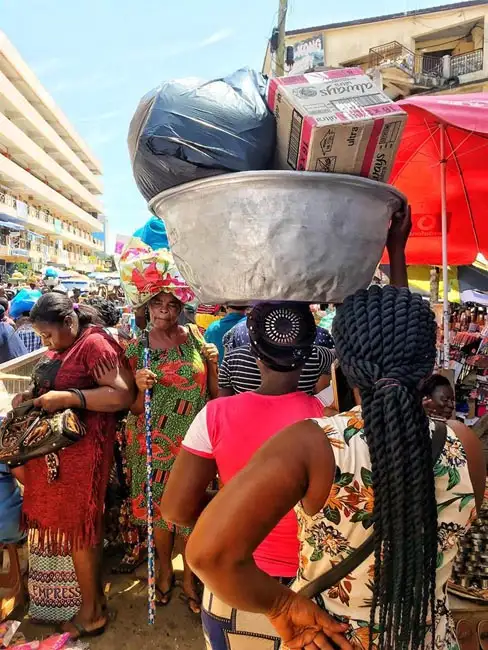
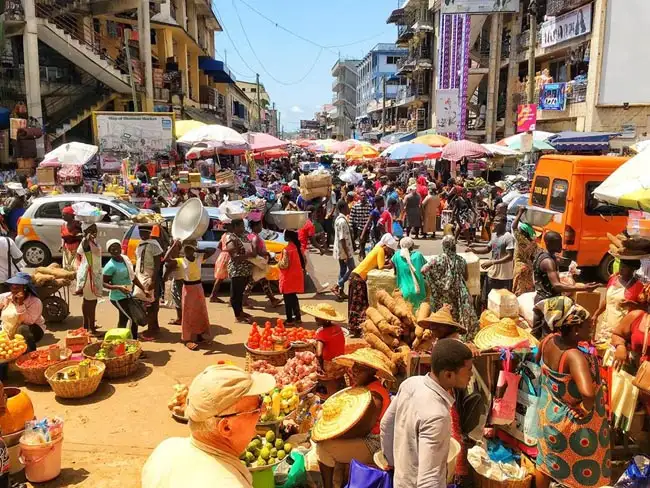
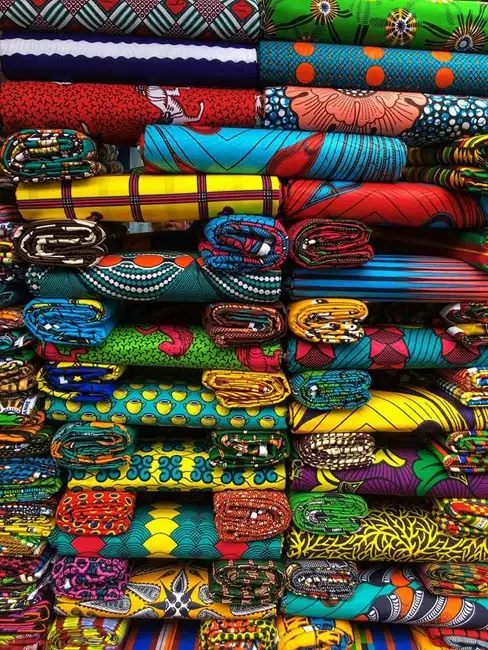
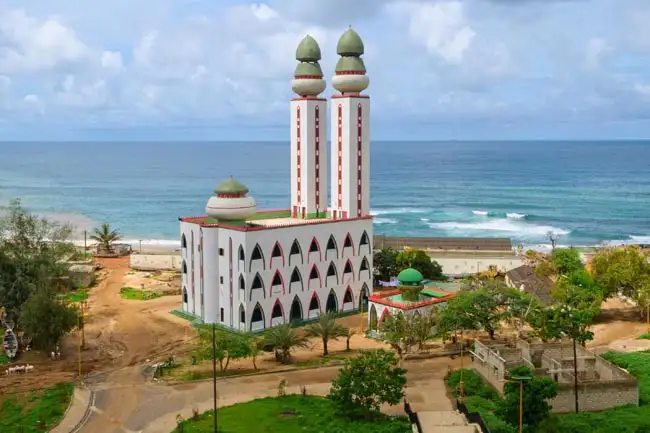
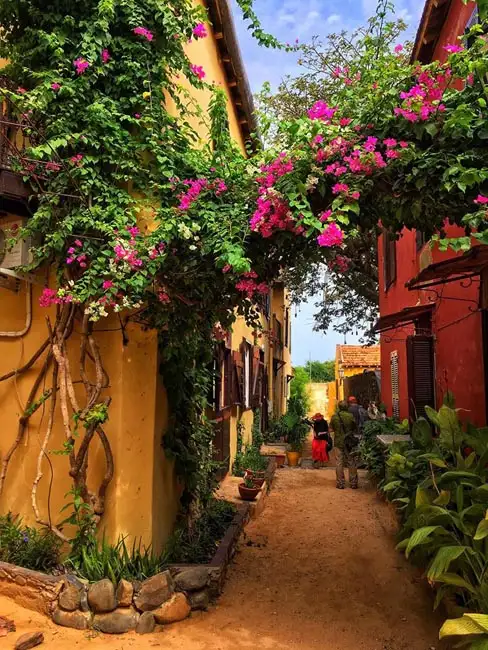
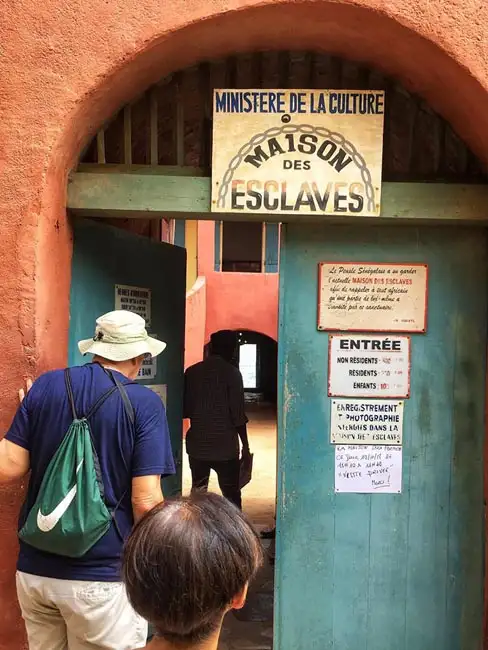
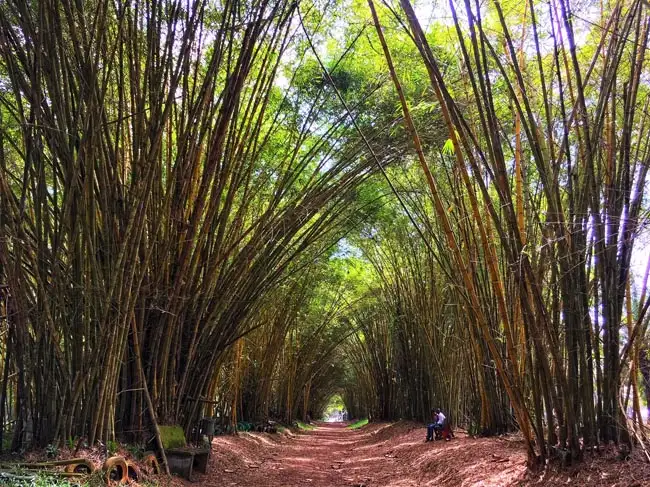
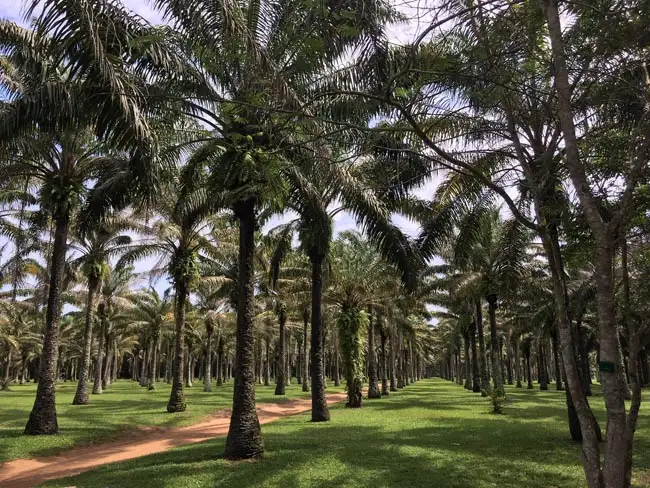
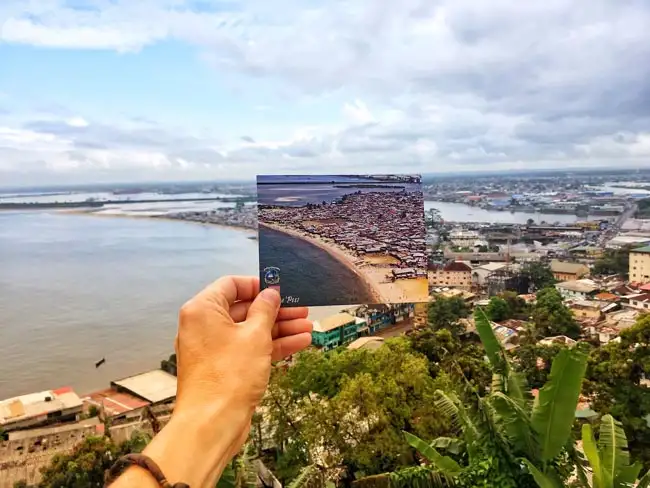
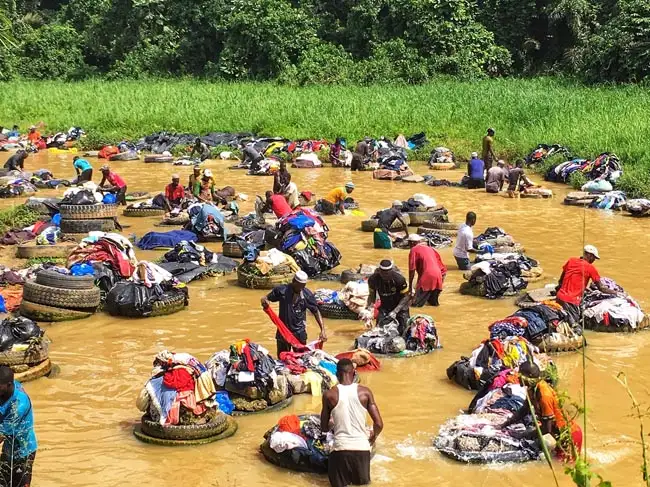
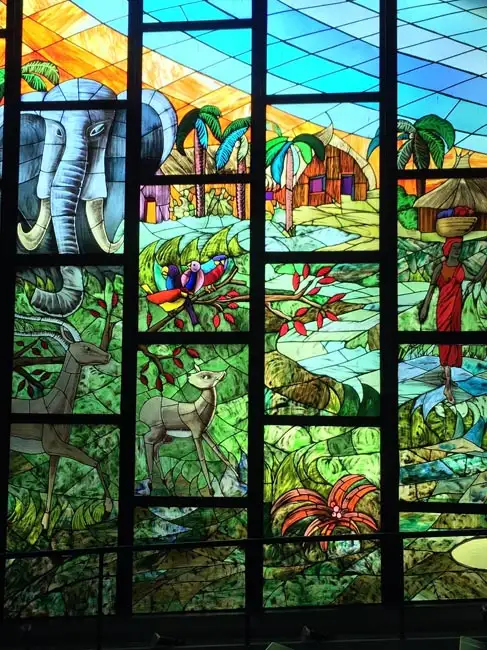
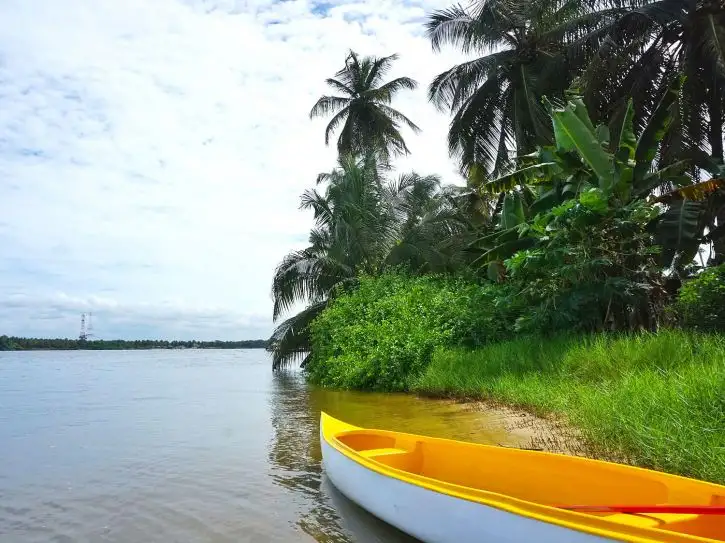
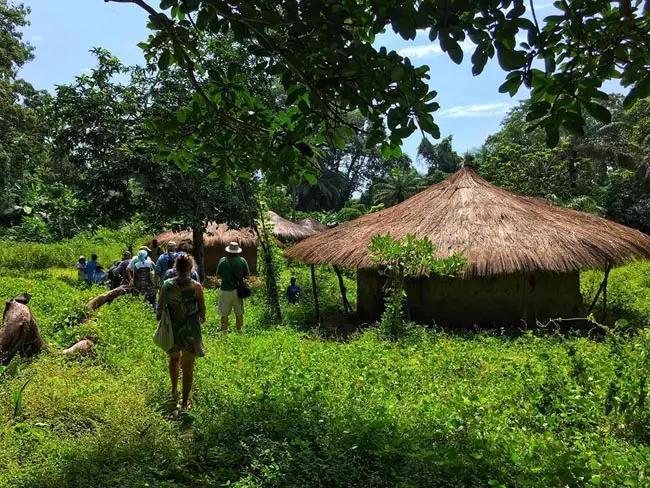
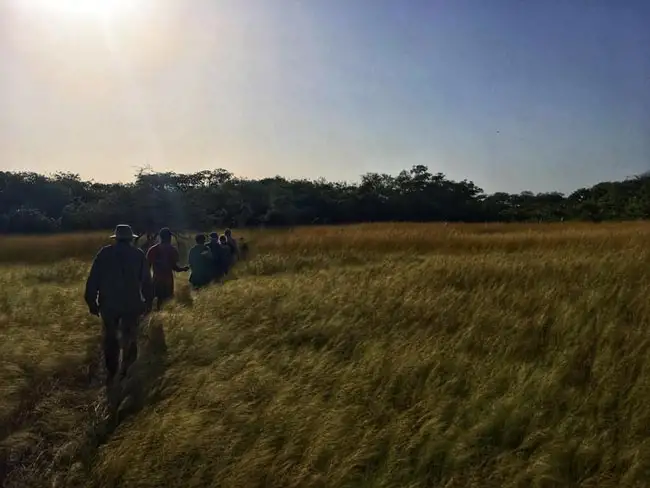
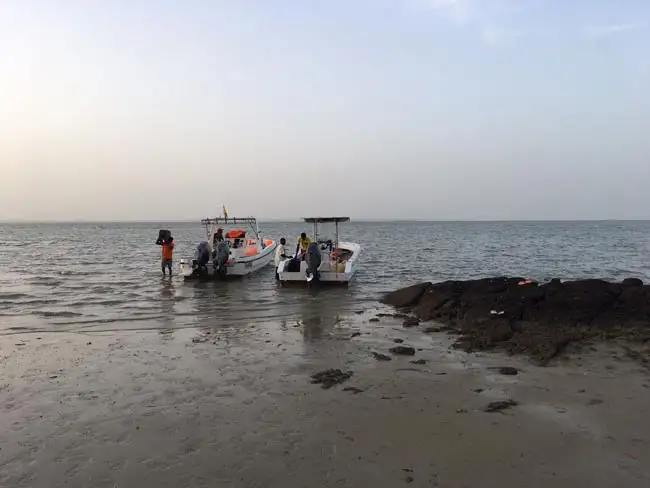
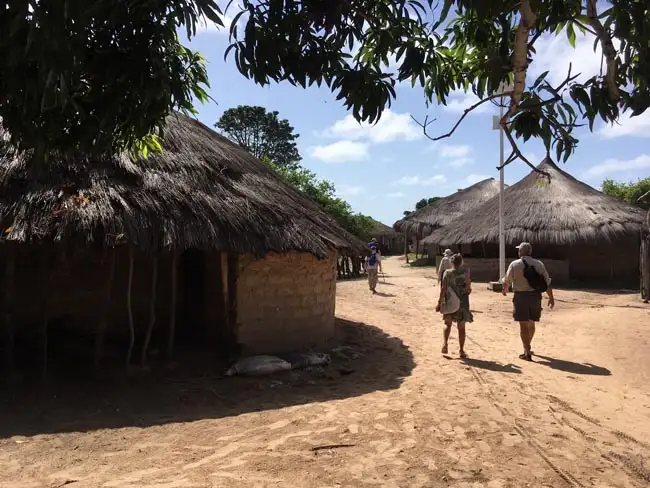
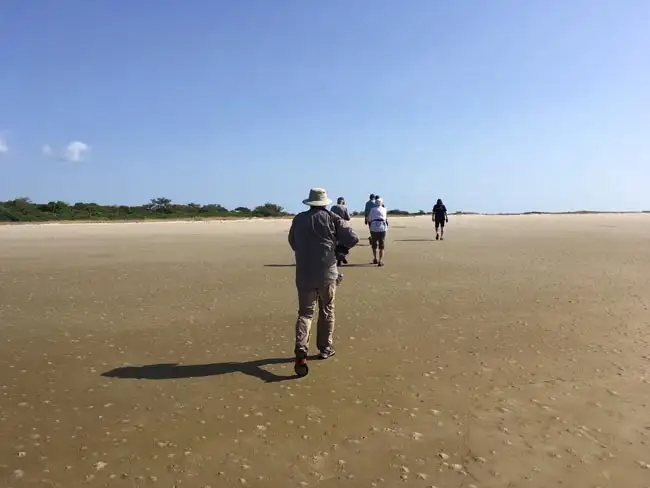
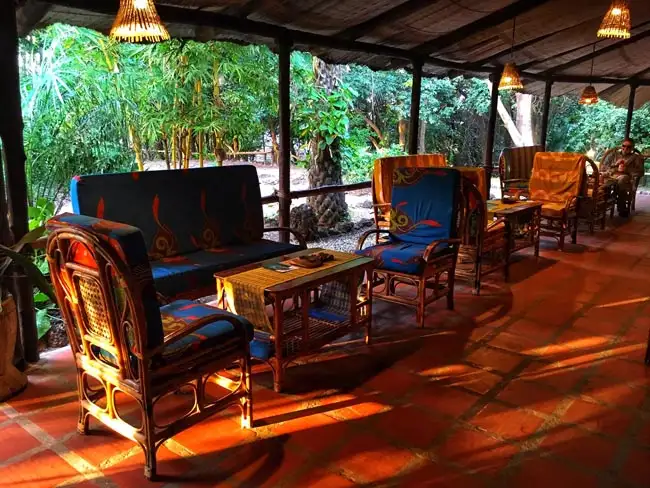
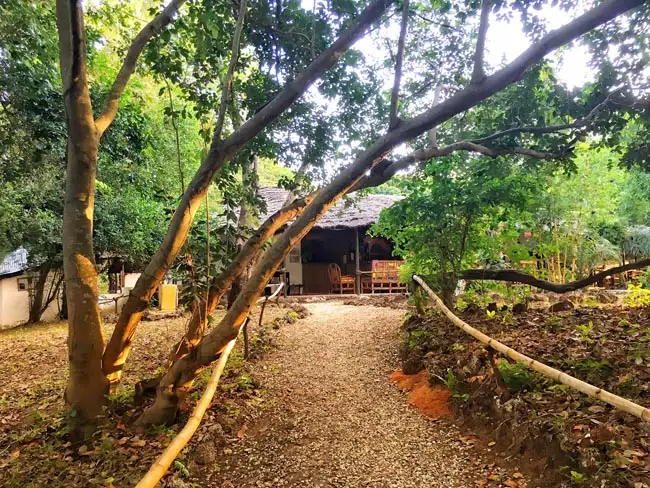
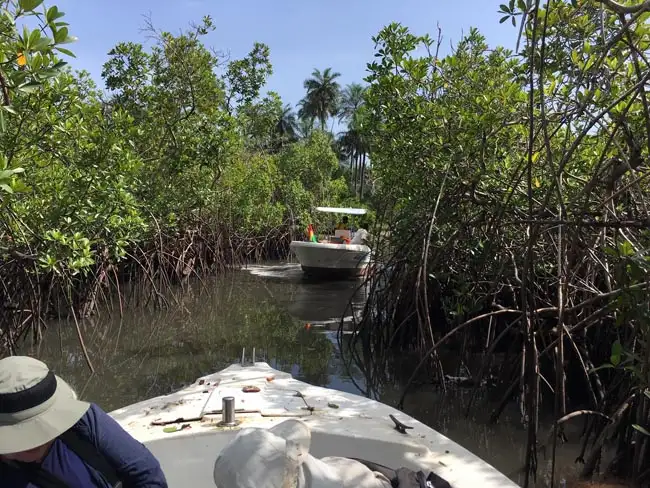
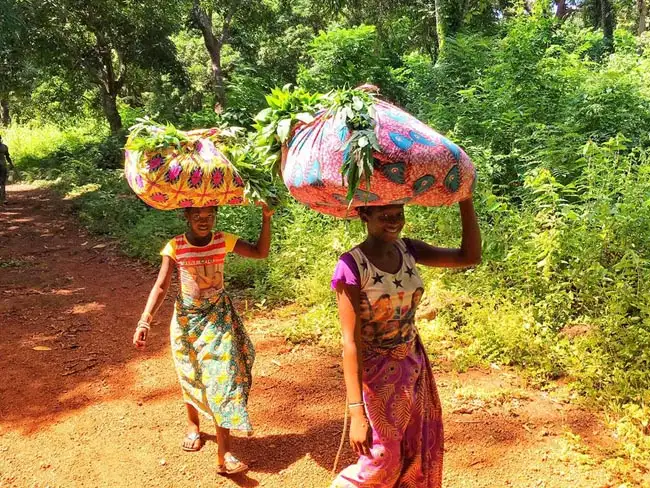
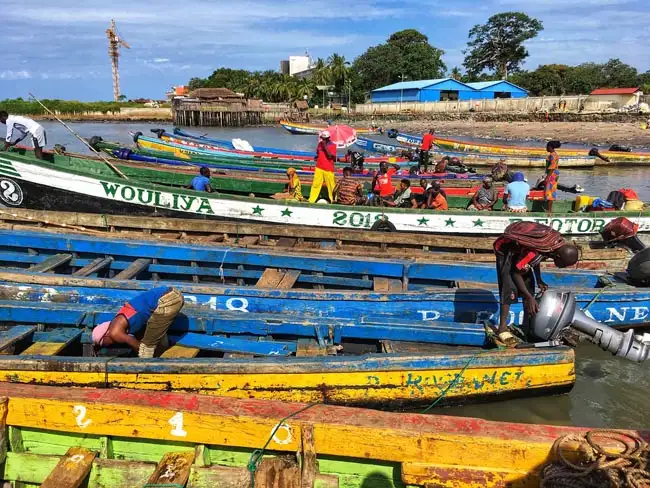
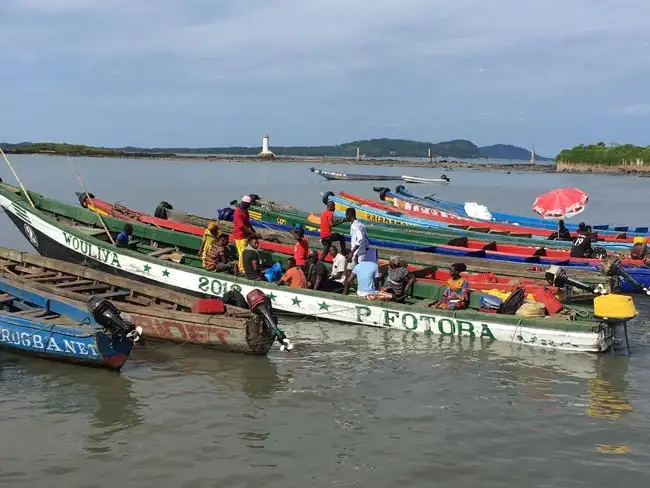
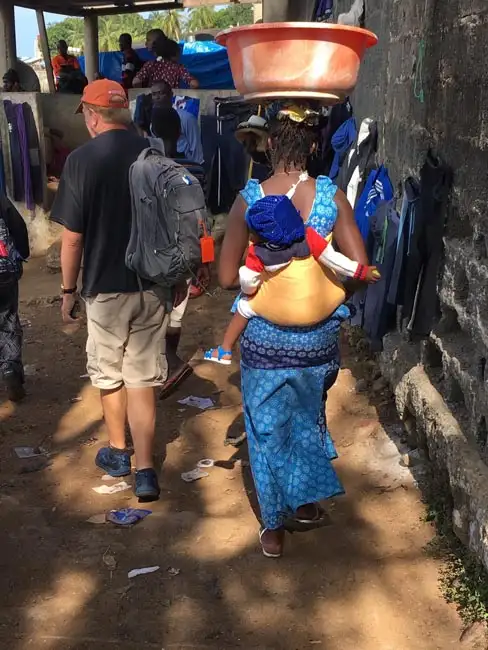
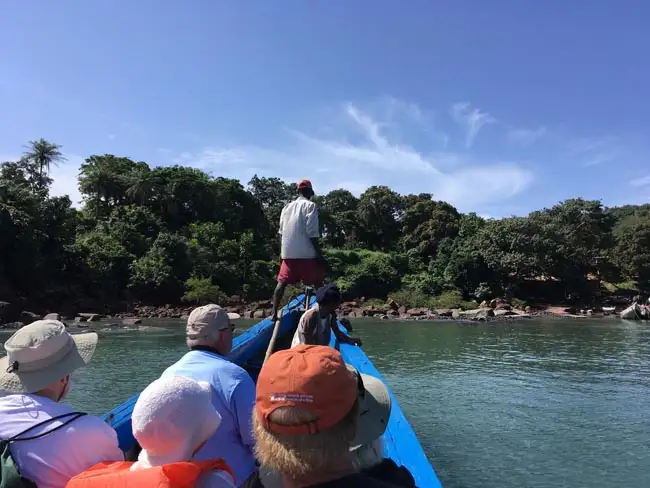
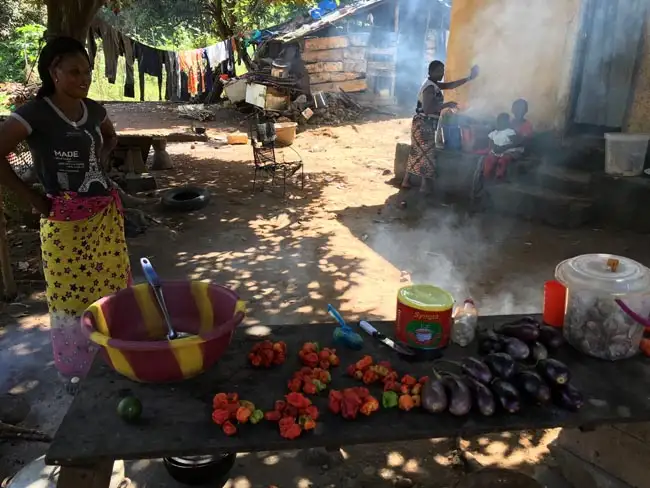
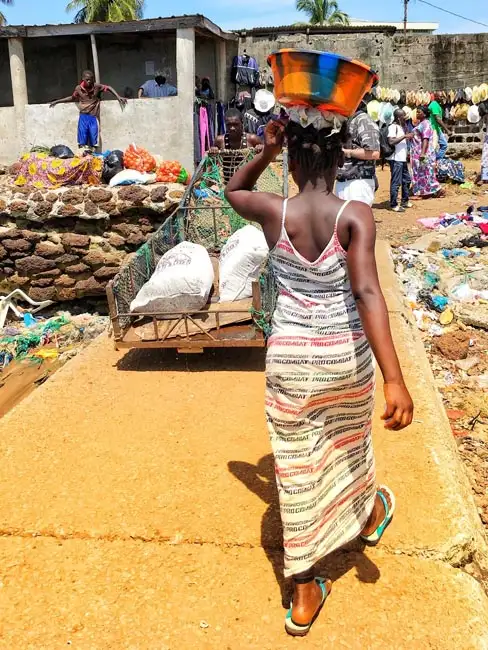
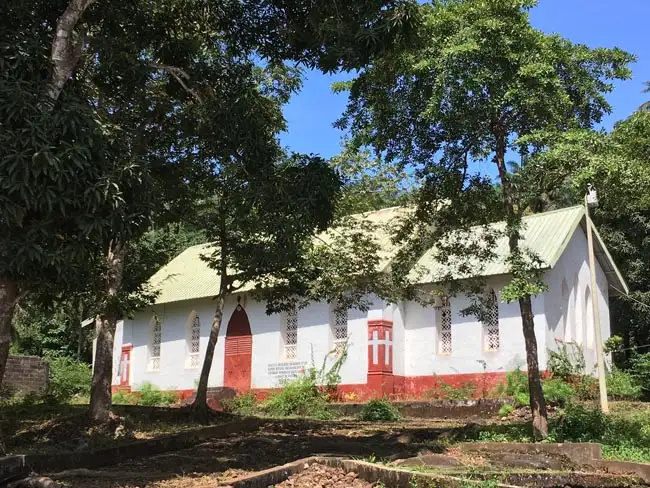
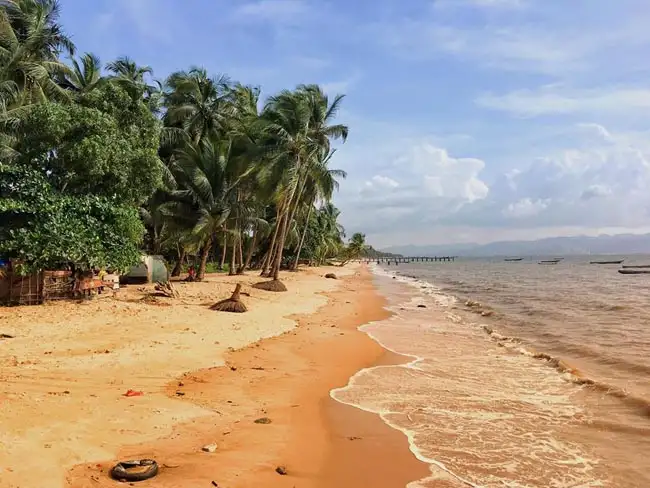
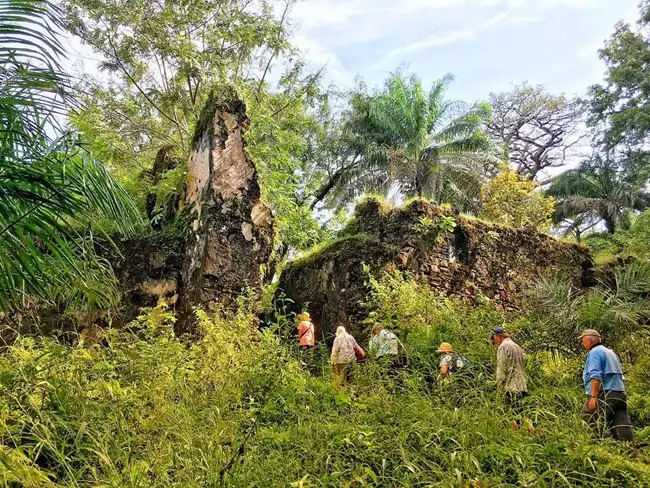
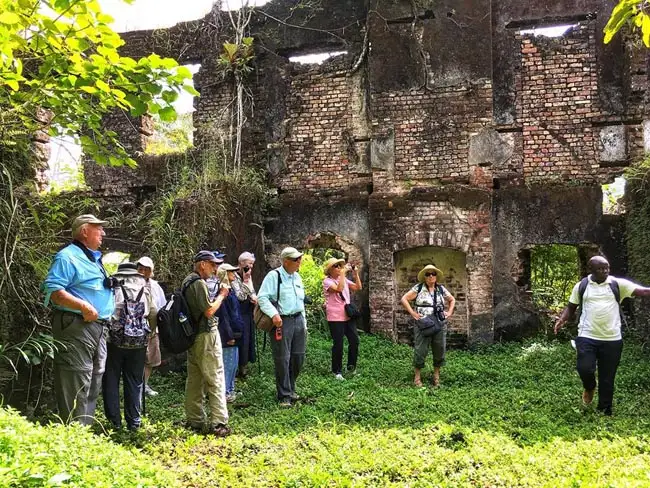
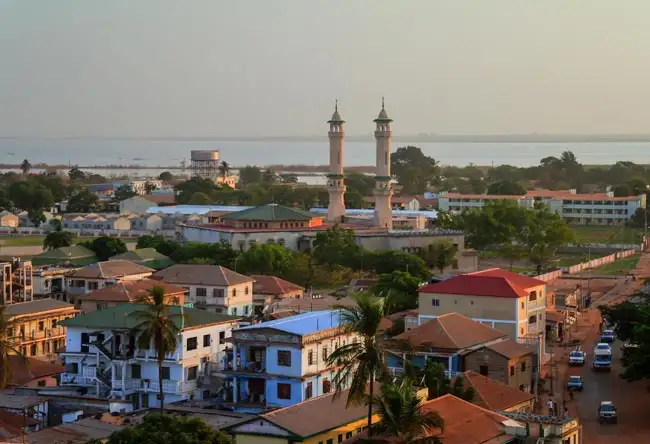
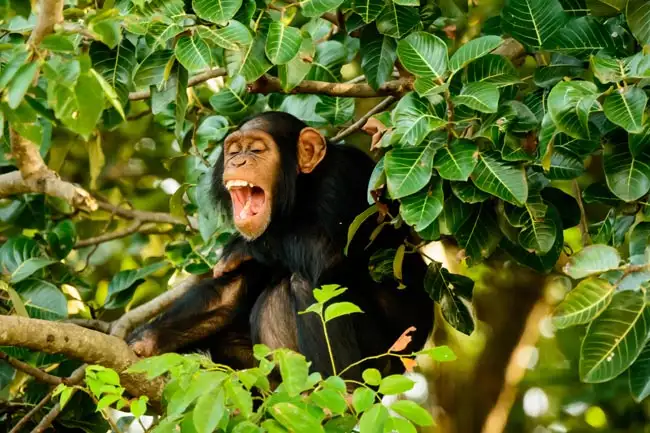
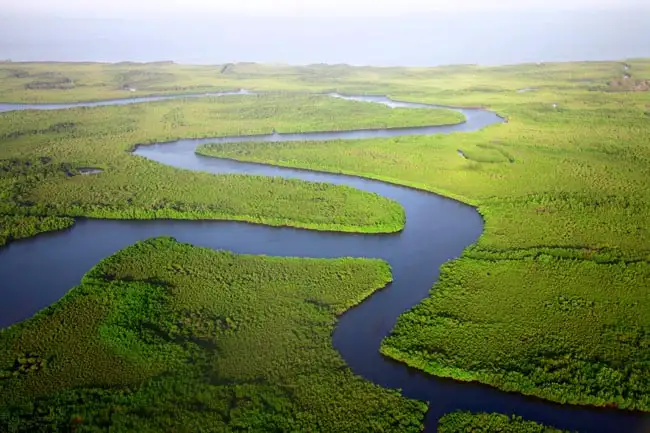
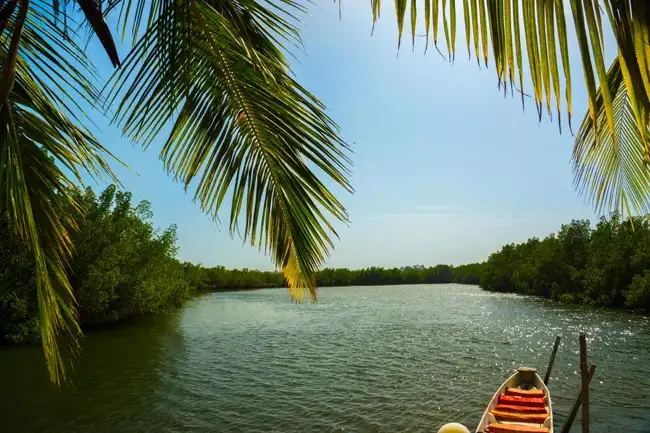
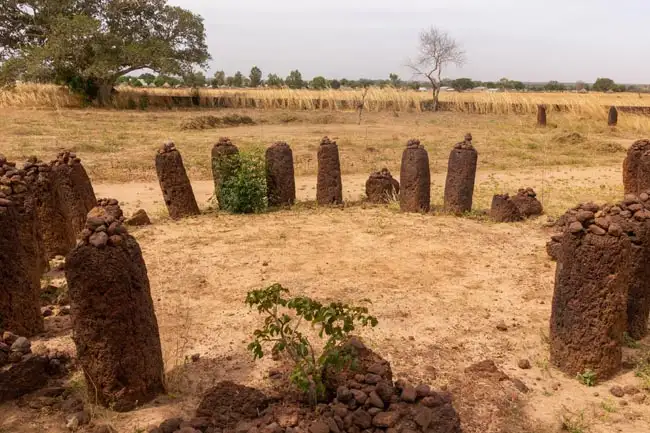
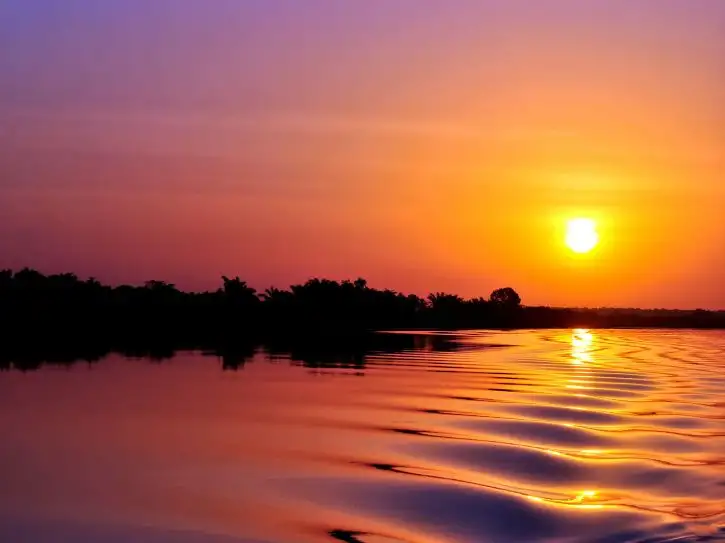
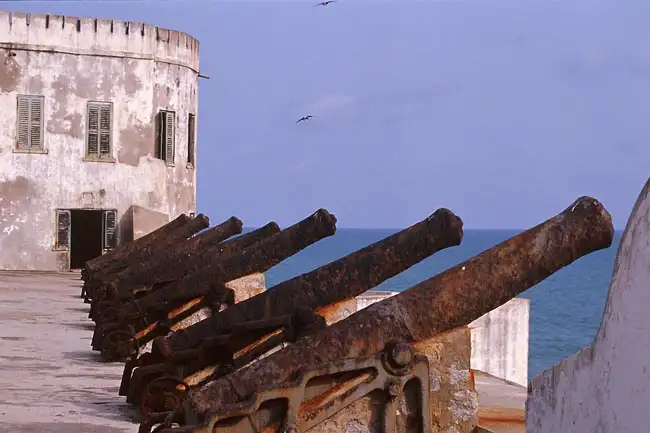
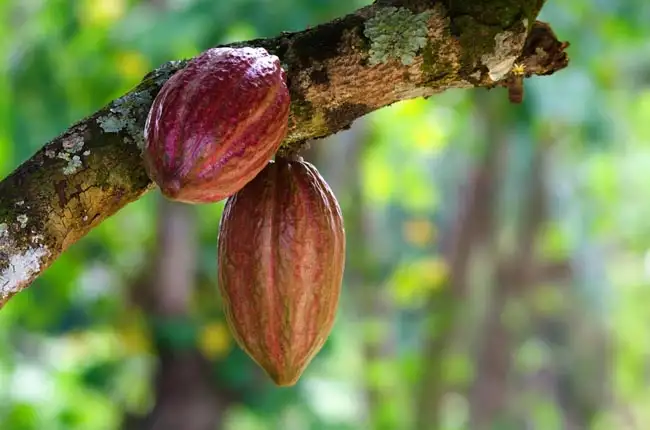
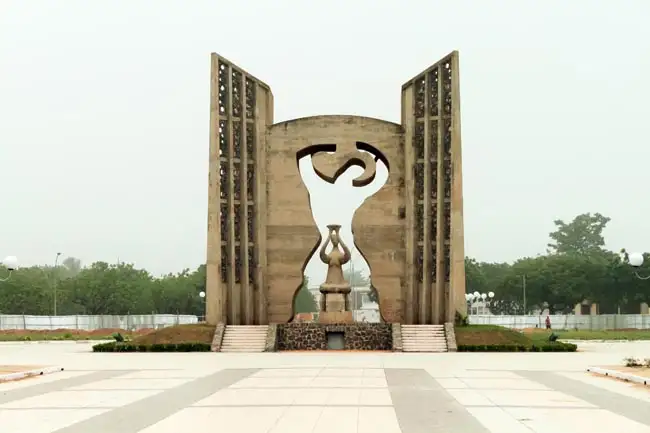
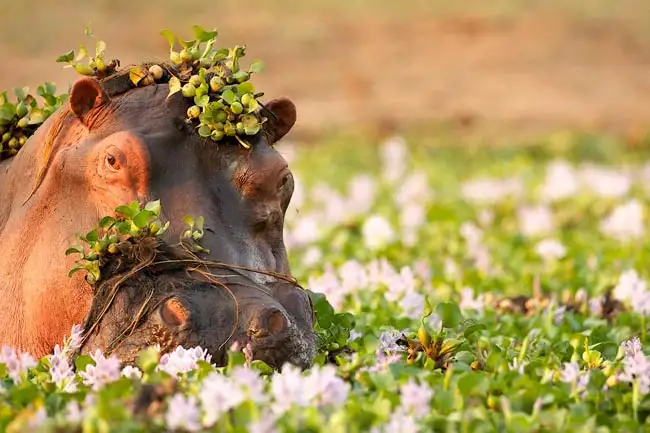
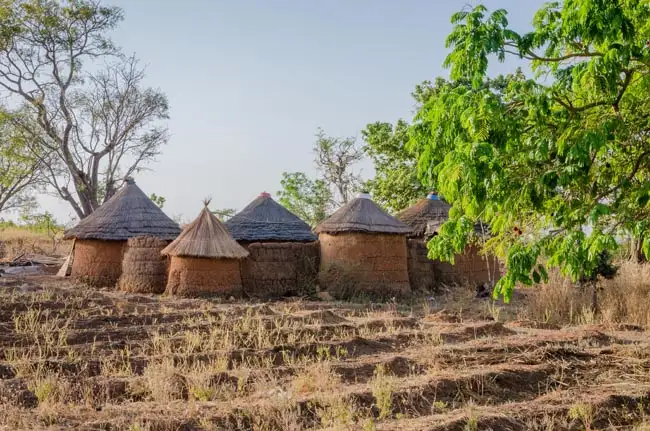
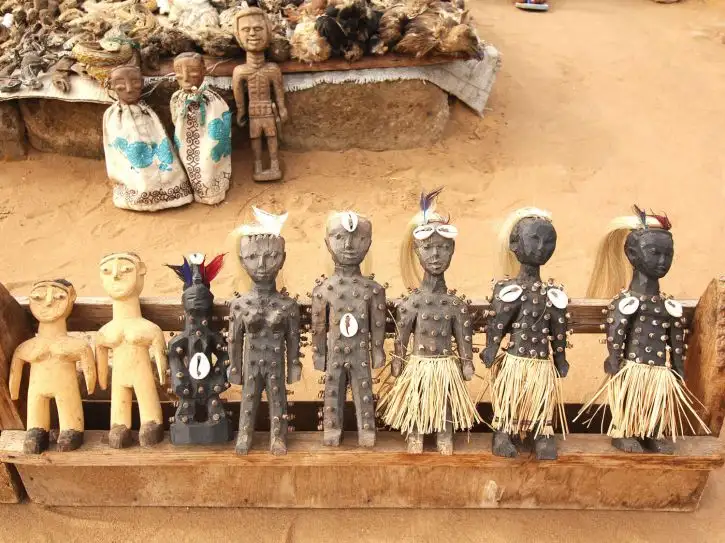
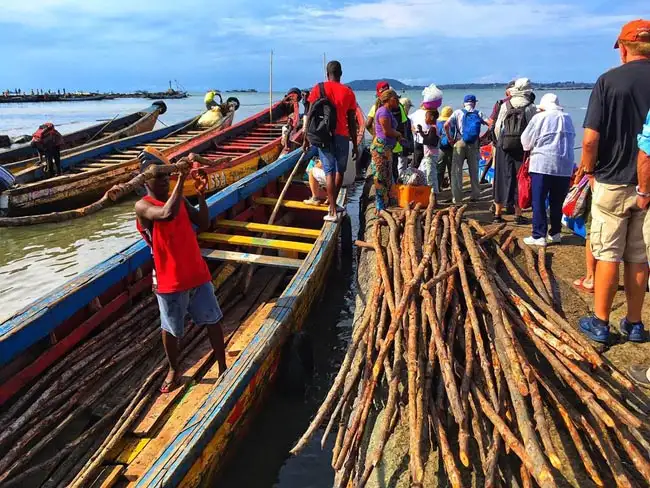



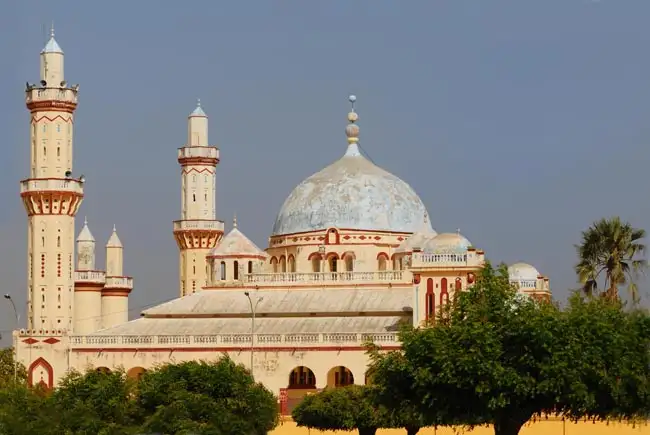
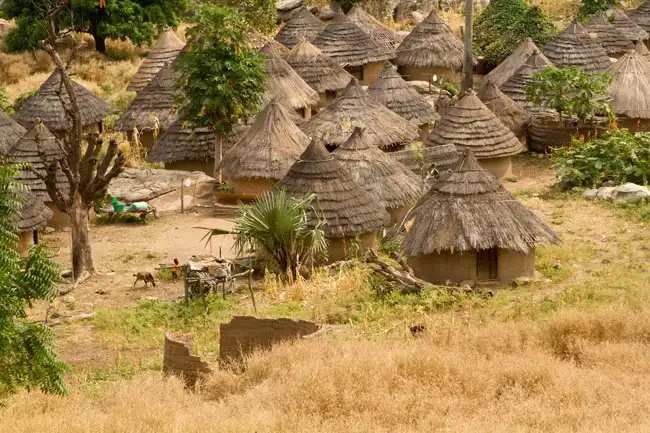
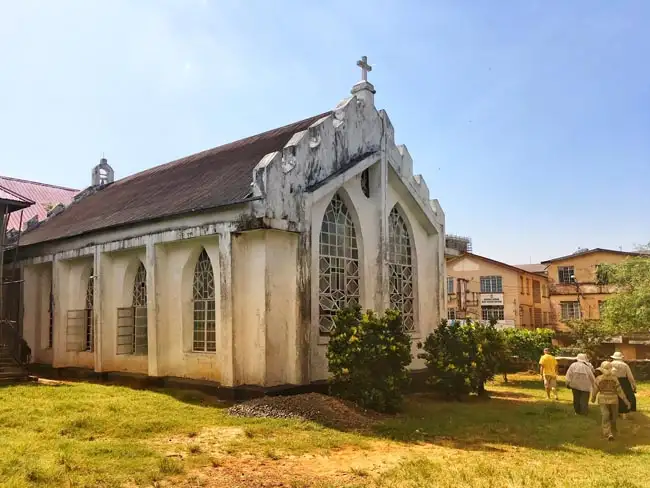
Excellent
Overall Rating
4.6
Extend Your Trip
This tour is part of a series that can be upgraded to make for a longer trip.
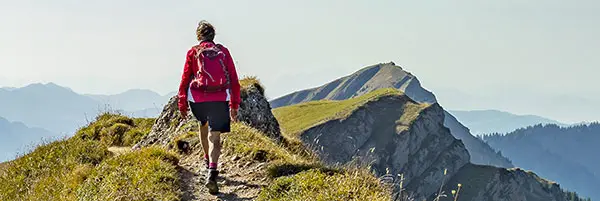
Fast and easy
Book this tour
Book your unforgettable adventure today! For any questions or advice, don't hesitate to contact us.
Have questions?
Contact Us
1-800-665-3998
- Final payment is due 90 days prior to departure.
- A non-refundable $1000 USD deposit is payable at the time of booking
- Optional Single Supplement: $2550 USD (number of singles limited).
This tour may require a mandatory single supplement charge of $1870 USD if you join our share program and we are unable to pair you. - Transferring to another tour or tour date is only permissible outside of 120 days prior to departure and is subject to a $100 USD change fee. (Read our cancellation policy for more info.)
- Internal flights (value CA$1900/US$1500) are INCLUDED in above tour price. Due to the nature of these flights and other arrangements, this tour requires a $1000 per person deposit and an additional pre-payment of $2000 at time of 'guarantee.' Contrary to our usual terms governing deposits, once paid these funds become 100% non-refundable/non-transferable. 2026 DATES TENTATIVE (they may shift a day or two depending on internal air)
Prices below are per person, twin-sharing costs in US Dollars (USD). Pricing does not include airfare to/from the tour and any applicable taxes. Get general information on flights to/from the tour.
Choose your departure date:
Frequently Asked Questions
- What is the maximum number of participants on a trip?Most of our tours carry a maximum of 18 participants; some tours (ie hiking tours) top out at 16. In the event that we do not achieve our minimum complement by our 90-day deadline, we may offer group members the option of paying a "small-group surcharge" as an alternative to cancellation. If all group members agree, we will confirm the trip at existing numbers; this surcharge is refundable in the event that we ultimately achieve our regular minimum. If the small group surcharge is not accepted, we will offer a refund of your deposit or a different trip of your choice.
- Can I extend my tour either at the beginning or end? What about stopovers?Yes, you can extend your tour either at the beginning or the end and we can book accommodation in our tour hotel. Stopovers are often permitted, depending on air routing. Stopovers usually carry a "stopover" fee levied by the airline.
- How do I make a reservation? How and when do I pay?The easiest way to make a reservation is via our website; during office hours, you are also more than welcome to contact us by telephone.
A non-refundable deposit is payable at the time of booking; if a reservation is made within 90 days, full payment is required. Some trips require a larger deposit. If international airline bookings require a non-refundable payment in order to secure space or the lowest available fare, we will require an increase in deposit equal to the cost of the ticket(s).
Early enrolment is always encouraged as group size is limited and some trips require greater preparation time.
Once we have received your deposit, we will confirm your space and send you a confirmation package containing your trip itinerary, any visa/travel permit related documents, invoice, clothing and equipment recommendations, general information on your destination(s), and forms for you to complete, sign and return to us. Your air e-tickets (if applicable), final hotel list, final trip itinerary, and instructions on how to join your tour, will be sent approximately 2-3 weeks prior to departure. - What about cancellations, refunds, and transfers?Please review our cancellation policy page for details.
- I am a single who prefers my own room. What is a single supplement?All of our tours have a single supplement for those who want to be guaranteed their own room at each location.
This supplement is a reflection of the fact that most hotels around the world do not discount the regular twin-share rate for a room by 50% for only one person occupying a room. Most hotels will give a break on the price, but usually in the range of 25-30% of the twin-share rate. This difference, multiplied by each night, amounts to the single supplement.
The conventional amount can also vary from country to country and some destinations are more expensive than others for single occupancy. In order to be "single friendly," the supplements we apply are not a profit centre for us and we do our best to keep them as reasonable as possible.
On most tours we limit the number of singles available, not to be punitive, but rather because many hotels allow for only a limited number of singles; some smaller hotels at remote locations also have a limited number of single rooms available.
Please note that most single rooms around the world are smaller than twin-share rooms and will likely have only one bed. - Do you have a shared accommodation program?Yes! If you are single traveller and are willing to share, we will do our best to pair you with a same-gender roommate. On most of our tours, if we fail to pair you, we will absorb the single supplement fee and you will default to a single room at no extra charge. At some destinations, however, where single rooms are not significantly discounted, or not at all, we may apply a "mandatory" single in the event that we cannot find you a share partner. This is usually 50% of the usual supplement, but can be as much as 100%. If applicable, this proviso will be noted on each tour page on this website, on your invoice, and in our tour date/price book (available for download under "Resources").
Please choose a departure date!
